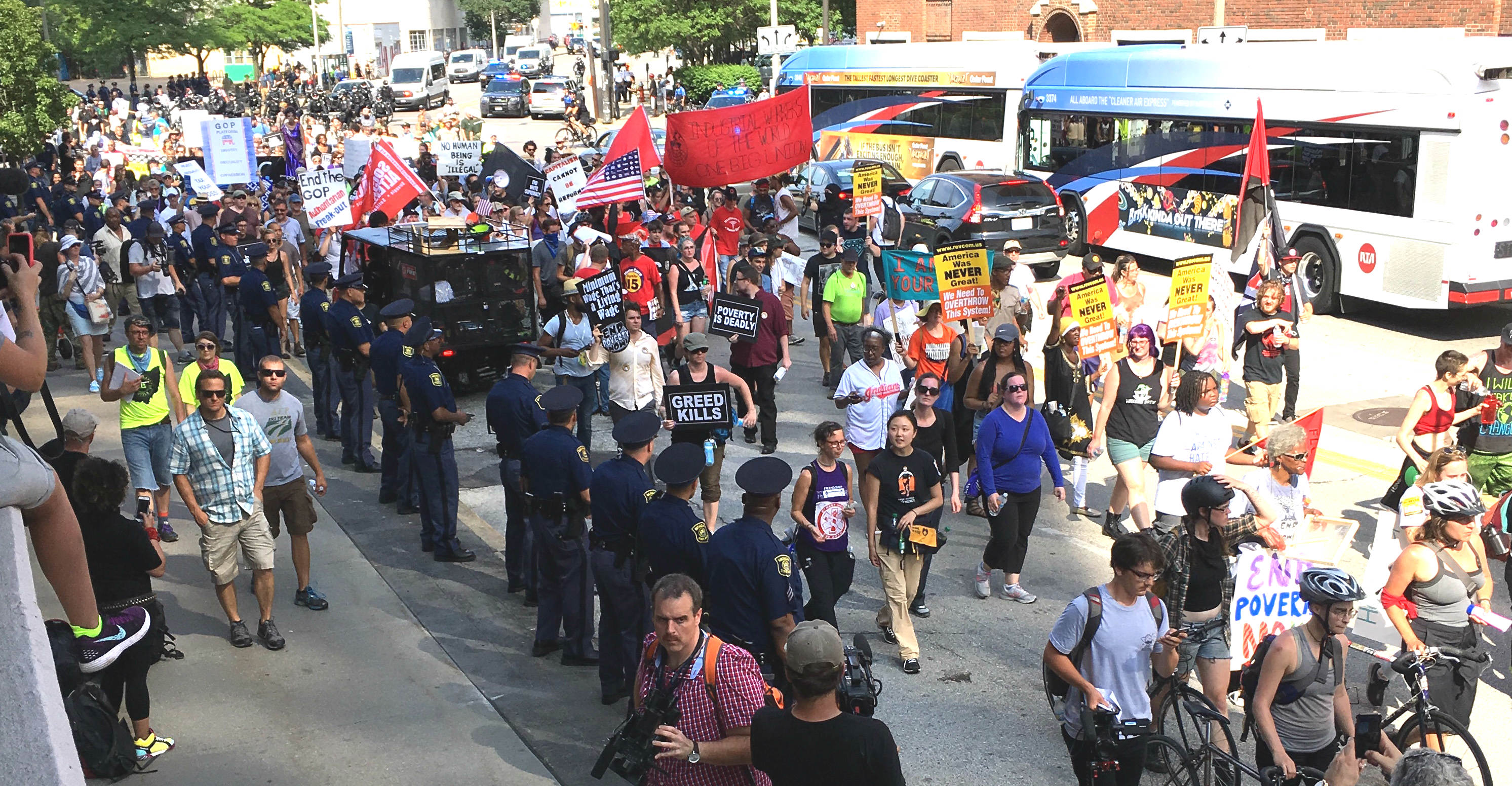
At over 1,000 people strong, the End Poverty March was the largest march of the week in Cleveland during the Republican National Convention. Northeast Ohio / AFSC
While most media outlets at the Republic National Convention (RNC) focused on speech plagiarism, Donald Trump, and potential clashes between police and protesters, AFSC joined other organizations and individuals to advocate for just, peaceful, sustainable, and democratic policies at public events around the city, including the “People’s Justice and Peace Convention.”
Here are three takeaways from our week in Cleveland:
1. We must create more opportunities for all people to take part in the political process.
Current public policies disproportionately benefit corporations and the wealthy, while ignoring the concerns of many in the U.S. In the days leading up to the RNC, a local coalition in Northeast Ohio—including AFSC—hosted the People’s Justice and Peace Convention as an educational and organizing opportunity to promote justice, peace, and nonviolence.
Our People’s Convention included a diversity of voices and experiences, from local to national, transcending any one political party or perspective. Throughout the three-day People’s Convention, more than 200 local individuals and national activists took part in workshops and developing a “People’s Justice and Peace Platform” containing several hundred specific “planks” within five areas: economic justice, racial/social justice, environmental justice, political justice, and international justice.

The People’s Platform—delivered to RNC representatives in Cleveland last week and to Democratic National Convention representatives in Philadelphia this week—addressed a range of issues and solutions based on real needs in participants’ communities. These included health care and housing rights, education, wages, agriculture, immigration, police brutality, the prison industrial complex, climate change and justice, trade agreements, militarism, federal budget priorities, voting rights, ending corporate constitutional rights, and equal ballot and media access to all qualified candidates and political parties.
Just as important as the People’s Convention producing the platform was the process in which it was created. The process reflected a commitment to authentically include in decision-making the voices of those from marginalized communities often ignored by the power elite—including people of color, immigrants, and the poor. Throughout the convention, participants forged greater trust and a desire to continue working together in alliance to push for the platform.
The last day of the RNC, six of us representing the People’s Convention presented a summary of the People’s Platform at a public square in downtown Cleveland, before marching through a throng of RNC conventioneers, protesters, and media to deliver the platform to RNC representatives.
2. We need to encourage—not intimidate—peaceful protesters.
Many organizations that sponsored the People’s Convention took to the streets on the opening day of the RNC, to rally and march to end poverty and promote economic and social justice. It was the largest march of the week.
In a vacant lot in a low-income east side Cleveland neighborhood, more than 1,000 people heard from speakers on critical issues—from raising the minimum wage to ending home foreclosures—before marching through the streets in a loud but peaceful demonstration that ended only a few blocks away from the RNC venue, Quicken Loans Arena (Quicken Loans, by the way, is responsible for fraudulent home loans and misleading lending practices, which targeted the elderly and vulnerable homeowners).
In the weeks leading up to the RNC, many media outlets sensationalized the possibility of violence and confrontations between police and protesters. And the presence and militarization of police in Cleveland was astounding, with police brought in from across the country.
Despite the intimidating presence of police during the week, protests were largely peaceful. Many, if not most, marches—including our End Poverty Now event—had their own “peacekeepers” to monitor marcher behavior. There were also trained observers from the National Lawyers Guild and even the United Nations.
The lesson: While passion and conflict is inevitable, violence is not.
3. We all have more work to do.

In this election season—like many before it—we’ve heard many politicians claiming that they are calling for an end to the political status quo. But the real change has long been sought—and worked for—by grassroots justice, peace, and democracy organizations and the countless individuals struggling to ensure their voices are heard, their needs met, and their communities helped by the people elected to serve them.
Real social change goes beyond electing candidates and changing laws and rules. It requires creating opportunities that permit the full blossoming of social movements that are inclusive and effective.
The People’s Convention provided not only a weeklong venue to raise issues and solutions that might not otherwise be heard, but more importantly a long-term opportunity to deepen relationships with individuals and groups to complement one another’s efforts to create justice, peace, democracy, and sustainability.